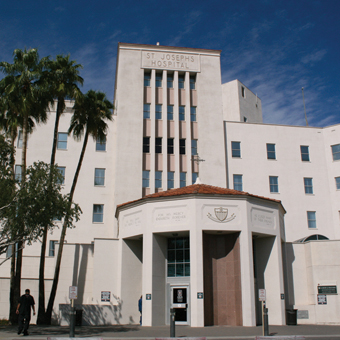Law must always be tempered by mercy if justice is to be truly served.
Excommunication was once considered a passé feature of the ancient church, conjuring up images of the Holy Roman Emperor Henry IV walking barefoot in the snow in 1077 to Canossa to seek the mercy of Pope Gregory VII. Or perhaps one thinks of the memorable scene from Becket, when Richard Burton’s Archbishop Thomas, with no lack of ceremony, turns his authority against Peter O’Toole’s King Henry II.
Those medieval antagonists could not have foreseen the circumstances of excommunication’s most recent return. In May the bishop of Phoenix, Thomas Olmsted, announced that an abortion had taken place in late 2009 at St. Joseph Hospital and Medical Center in Phoenix, apparently in response to a news story about the abortion. The patient, a mother of four, was suffering from pulmonary hypertension, a condition the medical staff judged would lead to her death if her 11-week pregnancy continued.
The hospital’s ethics committee signed off on the abortion because of the danger to the mother. One of its members, Mercy Sister Margaret Mary McBride, then vice president of mission integration, was judged by Olmsted to be “automatically excommunicated” by her participation in the decision because she “held a position of authority at the hospital and was frequently consulted on ethical matters.”
Olmsted’s decision was greeted with both applause and protest. Moralists debated whether the requirements of a “direct abortion” had been met, while canonists questioned the penalty, noting the required lack of malicious intent to violate the law.
There can be no doubt that church teaching condemns direct abortion, even in cases of rape, incest, or danger to the mother. The rare exception is the “double effect,” applied to situations such as an ectopic pregnancy or a cancerous uterus, when removal of the diseased organ has the unintended consequence of removing the developing fetus.
At the same time the situation faced by the mother and her family, the medical staff, and McBride and the ethics committee would be enough to make even the most morally adept lose confidence. We must in charity trust that they acted in good conscience. But even granting the moral rectitude of Olmsted’s judgment, there are other values at stake.
An excommunication is finally a pastoral tool-albeit a severe one-a call for an errant member of the church to correct his or her ways. It does not have to be applied, just as when in civil law a judge shows leniency because of extenuating circumstances. Excommunication can also be revoked as an act of charity, as Pope Benedict XVI did in 2009 when he rehabilitated four bishops of the traditionalist Society of St. Pius X. Seen in this light I wonder if the bishop has missed the mark by making a public example of a particularly harrowing case.
In fact the public invocation of excommunication against McBride, described by a colleague as “the moral conscience of the hospital,” rallied the faithful to her side rather than striking a blow for the pro-life cause. It will also no doubt have a chilling effect on any Catholic who, faced with ever-new moral dilemmas offered by medical technologies, fears a similar penalty for making the “wrong” choice in a difficult situation.
In the Gospel of Matthew, Jesus counsels his disciples to deal with problems in the church first privately: “If another member of the church sins against you, go and point out the fault when the two of you are alone” (18:15-17). According to reports Olmsted adapted this advice when he first learned of the situation at St. Joseph’s. Unfortunately that private, pastoral conversation did not remain so.
Instead the good name of a religious woman has been called into question, and the faithful have lined up on opposing sides. Left forgotten is the bereft mother who not only has lost her child but whose privacy has been violated by whomever informed the bishop or the press of the abortion.
Conspicuously silent in all this has been McBride, who, perhaps keenly aware of the tragedy of the situation, has declined to defend herself publicly and further risk the exposure of that grieving mother. And for that I applaud her.
This article appeared in the August 2010 issue of U.S. Catholic (Vol. 75, No. 8, page 8).
Image: St. Joseph’s Hospital and Medical Center in Phoenix, Arizona.















Add comment